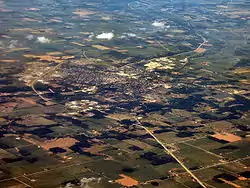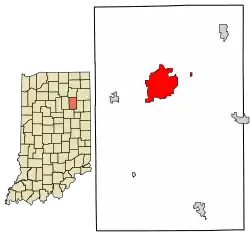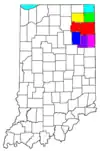Huntington, Indiana
Huntington, known as the "Lime City", is the largest city in and the county seat of Huntington County, Indiana, United States.[4] It is in Huntington and Union townships. It is also part of Fort Wayne, Indiana's metropolitan area. The population was 17,022 at the 2020 census.
Huntington, Indiana | |
|---|---|
 Aerial view of Huntington looking northeast. | |
| Nickname: "The Lime City" | |
 Location of Huntington in Huntington County, Indiana | |
| Coordinates: 40°52′55″N 85°29′44″W | |
| Country | United States |
| State | Indiana |
| County | Huntington |
| Government | |
| • Mayor | Richard Strick (I) |
| Area | |
| • Total | 9.45 sq mi (24.47 km2) |
| • Land | 9.31 sq mi (24.12 km2) |
| • Water | 0.14 sq mi (0.35 km2) |
| Elevation | 748 ft (228 m) |
| Population (2020) | |
| • Total | 17,022 |
| • Density | 1,827.96/sq mi (705.81/km2) |
| Time zone | UTC−5 (EST) |
| • Summer (DST) | UTC−4 (EDT) |
| ZIP Code | 46750 |
| Area code | 260 |
| FIPS code | 18-35302[2] |
| GNIS feature ID | 0436634[3] |
| Website | www.huntington.in.us/city |
Geography
According to the 2010 census, Huntington has a total area of 8.844 square miles (22.91 km2), of which 8.71 square miles (22.56 km2) (or 98.48%) is land and 0.134 square miles (0.35 km2) (or 1.52%) is water.[5]
Demographics
| Census | Pop. | Note | %± |
|---|---|---|---|
| 1850 | 594 | — | |
| 1860 | 1,664 | 180.1% | |
| 1870 | 2,925 | 75.8% | |
| 1880 | 3,863 | 32.1% | |
| 1890 | 7,328 | 89.7% | |
| 1900 | 9,491 | 29.5% | |
| 1910 | 10,272 | 8.2% | |
| 1920 | 14,000 | 36.3% | |
| 1930 | 13,420 | −4.1% | |
| 1940 | 13,903 | 3.6% | |
| 1950 | 15,079 | 8.5% | |
| 1960 | 16,185 | 7.3% | |
| 1970 | 16,217 | 0.2% | |
| 1980 | 16,202 | −0.1% | |
| 1990 | 16,389 | 1.2% | |
| 2000 | 17,450 | 6.5% | |
| 2010 | 17,391 | −0.3% | |
| 2020 | 17,022 | −2.1% | |
| U.S. Decennial Census[6] | |||
2010 census
As of the census[7] of 2010, there were 17,391 people, 6,566 households, and 4,197 families living in the city. The population density was 1,996.7 inhabitants per square mile (770.9/km2). There were 7,487 housing units at an average density of 859.6 per square mile (331.9/km2). The racial makeup of the city was 96.4% White, 0.6% African American, 0.4% Native American, 0.5% Asian, 0.6% from other races, and 1.4% from two or more races. Hispanic or Latino of any race were 2.4% of the population.
There were 6,566 households, of which 34.1% had children under the age of 18 living with them, 45.2% were married couples living together, 13.3% had a female householder with no husband present, 5.4% had a male householder with no wife present, and 36.1% were non-families. Of all households 30.4% were made up of individuals, and 12.5% had someone living alone who was 65 years of age or older. The average household size was 2.48 and the average family size was 3.06.
The median age in the city was 33.4 years. 24.8% of residents were under the age of 18; 13.5% were between the ages of 18 and 24; 25.5% were from 25 to 44; 22.5% were from 45 to 64; and 13.5% were 65 years of age or older. The gender makeup of the city was 47.7% male and 52.3% female.
2000 census
As of the census[2] of 2000, there were 17,450 people, 6,717 households, and 4,419 families living in the city. The population density was 2,091.0 inhabitants per square mile (807.3/km2). There were 7,262 housing units at an average density of 870.2 per square mile (336.0/km2). The main religion is Roman Catholic, with around 42% of the city attending masses. The racial makeup of the city was 97.83% White, 0.21% African American, 0.45% Native American, 0.45% Asian, 0.02% Pacific Islander, 0.30% from other races, and 0.73% from two or more races. Hispanic or Latino of any race were 1.12% of the population.
There were 6,717 households, out of which 33.5% had children under the age of 18 living with them, 48.9% were married couples living together, 12.4% had a female householder with no husband present, and 34.2% were non-families. Of all households 29.0% were made up of individuals, and 12.0% had someone living alone who was 65 years of age or older. The average household size was 2.46 and the average family size was 3.03.
In the city, the population was spread out, with 26.2% under the age of 18, 12.9% from 18 to 24, 28.2% from 25 to 44, 18.9% from 45 to 64, and 13.8% who were 65 years of age or older. The median age was 33 years. For every 100 females, there were 91.5 males. For every 100 females age 18 and over, there were 87.3 males.
The median income for a household in the city was $45,600, and the median income for a family was $56,454. Males had a median income of $35,830 versus $26,921 for females. The per capita income for the city was $21,242. About 5.2% of families and 7.1% of the population were below the poverty line, including 8.2% of those under age 18 and 6.4% of those age 65 or over.
Schools
The Huntington County Community School Corporation serves the city of Huntington and all of Huntington County. The corporation's lone high school, Huntington North High School, is located in Huntington. The two corporation middle schools, Crestview Middle School, Riverview Middle School, and three of the five elementary schools lie just outside the city limits. The elementary schools include Flint Springs, Horace Mann, Lincoln, Roanoke, and Salamonie. Private schools include Huntington Catholic School operated by the Roman Catholic Church.
The town has a lending library, the Huntington City-Township Public Library.[8]
History
Name
Huntington was named by Capt. Elias Murray, a member of the legislature. The name Huntington is derived from Samuel Huntington, a judge, politician, and patriot in the American Revolution. Samuel Huntington is also known for being the 3rd Governor of Connecticut and the 7th President of the Continental Congress. Being a delegate to the Second Continental Congress, Huntington took part in voting for and signing the Declaration of Independence and the Articles of Confederation.
Early settlement
The county of Huntington was formally organized on December 2, 1834. The city of Huntington was first established by a group of pioneers, most notably Capt. Elias Murray. By 1849, Huntington contained 150 houses and a population of 700.[9]
Historical literature
.jpg.webp)
A small number of books have been published about the history of Huntington County, the first being History of Huntington County, Indiana originally published by Brant & Fuller. Two other books about Huntington include History of Huntington County, IN by Frank Sumner Bash in 1914 (describing its historical progress, its people, and its principal interests) and Huntington County, IN: Histories and Families by Turner Publishing Company in 1993 as a result of the Huntington County Historical Society officers and board of directors meeting in summer 1992 to discuss the family history of Huntington, the glue that has held together the city and county of Huntington in the heartland of the Midwest for more than 175 years.
Wabash and Erie Canal

The Wabash and Erie Canal was constructed through Huntington County in 1834 and added major economic benefit to the area. In addition to the Wabash River cutting through Huntington (see Forks of the Wabash), this newly opened trade route accelerated the population and economic growth in Huntington.
Economy
Catholic publisher Our Sunday Visitor is based in Huntington.
Communications
Local radio stations
- WJCI FM 102.9
- WBZQ AM 1300 La Jefa Radio (Spanish)
- WVSH FM 91.9 The Edge, high school station (Huntington North High School)
- WQHU FM 105.5 FUSE FM, Huntington University
Transportation
Huntington Municipal Airport, a small airport for general aviation, lies southeast of the city.
Several highways serve the city:
Notable people
Sports
- E. J. Tackett, professional bowler[10]
- Gary Dilley, swimmer, Olympic silver medalist
- Dusty Fahrnow, Indy Car driver
- Josh Hart, NHRA race car driver
- Lauren Johnson, professional runner [11]
- Harry Mehre, player for Notre Dame Fighting Irish football (1919–21) and coach of Georgia Bulldogs football (1928–37) and Ole Miss Rebels football (1938-45).
- Addison Wiley, American middle distance runner
Politics
- U. S. Lesh, 24th Indiana Attorney General
- Lambdin P. Milligan, Civil War-era insurrectionist
- J. Danforth Quayle, former vice president of the United States, U.S. senator, U.S. representative
- J. Edward Roush, U.S. representative, father of "911 Emergency System"
- James R. Slack, state senator and Civil War general
- Andy Zay, member of the Indiana Senate
Other
- Elizebeth (Smith) Friedman (1892–1980), author and pioneer in cryptology during WWI to WWII era, called "America's first female cryptanalyst"
- Todd Nightenhelser, Entrepreneur
- Jennifer Lancaster, author
- Mick Mars, guitarist of Mötley Crüe
- John F. Noll, Archbishop, founder of Our Sunday Visitor, a Roman Catholic newspaper and publishing company. Former pastor of St. Mary's Catholic Church
- Carrie M. Shoaff (1849–1939), artist, author, potter, playwright, correspondent
- Richard Leroy Walters, homeless philanthropist
- Dan Butler, Actor
- Joseph M. Woods, Musician, teacher. Central Catholic High School, 1946-1972. Director of Fort Wayne Summer Symphony, 1957-1992
- Johnny Sins, Astronaut, Firefighter, Plumber, and more!
Points of interest

- Church of the United Brethren in Christ National Headquarters
- David Alonzo and Elizabeth Purviance House
- Drover Town Historic District
- Forks of the Wabash
- Hawley Heights Historic District
- Hotel LaFontaine
- Huntington County Historical Museum
- Huntington Courthouse Square Historic District
- Huntington University Arboretum and Botanical Garden
- Huntington University
- J. Edward Roush Lake
- Merillat Centre for the Arts
- Moore/Carlew Building
- North Jefferson Street Historic District
- Old Plat Historic District
- Our Sunday Visitor
- Quayle Vice Presidential Learning Center
- Samuel Purviance House
- St. Peter's First Community Church
- Sheets Wildlife Museum and Learning Center
- Sunken Gardens
- Taylor-Zent House
- The Indiana Room Genealogy Center
- Victory Noll-St. Felix Friary Historic District
- William Street School
References
- "2020 U.S. Gazetteer Files". United States Census Bureau. Retrieved March 16, 2022.
- "U.S. Census website". United States Census Bureau. Retrieved January 31, 2008.
- "US Board on Geographic Names". United States Geological Survey. October 25, 2007. Retrieved January 31, 2008.
- "Find a County". National Association of Counties. Archived from the original on May 31, 2011. Retrieved June 7, 2011.
- "G001 - Geographic Identifiers - 2010 Census Summary File 1". United States Census Bureau. Archived from the original on February 13, 2020. Retrieved July 28, 2015.
- "Indiana's Census 2020 Redistricting Data Dashboard". Census.gov. Retrieved August 13, 2021.
- "U.S. Census website". United States Census Bureau. Retrieved December 11, 2012.
- "Indiana public library directory" (PDF). Indiana State Library. Retrieved March 7, 2018.
- Branson, Ronald. "Huntington County". Crossroads of America: Early Indiana History HUNTINGTON COUNTY. Indiana County History Preservation Society. Archived from the original on May 12, 2012. Retrieved December 5, 2011.
- Vint, Bill (December 17, 2015). "Memphis' Gary Faulkner Jr. Wins First Title in Rolltech PBA World Championship". Retrieved December 10, 2016.
- "The Lauren Johnson Story: From Over 2:20 For 800 In HS To The U.S. World Championships Team At 1,500". LetsRun.com. August 17, 2015. Retrieved April 29, 2019.
Further reading
- Williamson, David. The 47th Indiana Volunteer Infantry: A Civil War History (Jefferson, NC: McFarland & Company, Publishers), 2012. ISBN 0786465956.
- Williamson, David, ed. Slack's War: Selected Civil War Letters of General James R. Slack, 47th Indiana Volunteer Infantry, to His Wife, Ann, 1862–1865 (CreateSpace Publishing Platform), 2012. ISBN 1478379588.
- Williamson, David, ed. The 47th Indiana Volunteer Infantry: Court-Martial Case Files (CreateSpace Publishing Platform), 2012. ISBN 1477687572.
External links
- City of Huntington, Indiana website
- HuntingtonDaily.com, Huntington news website Archived 2010-04-06 at the Wayback Machine
- Huntington County Tab newspaper
- Huntington Herald Press daily newspaper
- Huntington County United Economic Development
- Huntington Indiana Information
- Huntington County Community School Corporation
- Huntington City-Township Public Library
